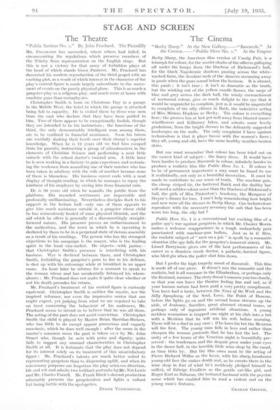STAGE AND SCREEN The Theatre
"Public Saviour No. 1." By John Frushard.. The Piccadilly Mn. FRE SHARD has succeeded, where others had failed, in circumventing the regulations which preserve members of the Trinity from representation on the English stage. But this is not a victory for that army of forbidden plays at the head of which stands Green Pastures., Mr. Frushard has decorated his modern reproduction of the third gospel with an exciting plot, as a result of which interest in the character of the play's central figure is made largely subordinate to the move- ment of events on the purely physical plane. This is as much a gangster-play as a religious play, and much more at home with machine guns than metaphysics.
Christopher Smith is born on Christmas Day in a garage in the Middle West, the hotel to which the garage is attached being full to capacity. He is visited there by three wise men from the cast who declare • that they have been guided to him. Two of them appear to be exceptionally foolish, though they are intended to be his instructors; the functions of the third, the, only demonstrably intelligent man among them, are to be confined. to financial assistance. Soon his tutors are wistfully shaking their heads over their charge's superior knowledge. When he . is 12 years old' we find him escaped from his parent, instructing' a group of schoolmasters in the elements of Christian Science and performing a neat little miracle with the school doctor's twisted arm. A little later be is seen working in a factory to gain experience and restrain- ing the workmen from assaulting One of their number who has been taken in adultery with the 'wife of another because acne of them is blameless. His business career ends with a neat display of thought-reading, in which he manages to repay the kindness of his employer by saving him from financial ruin.
He is 30 years old when he assaults thepublic from the . . .
platform. His recorded sentiments are impeccable and profoundly unilluminating. Nevertheless disciples flock to his support in the lecture' hall—only one of them appears to give him much assistance outside it, a gangster whose child he has miraculously healed of some physical blemish, and the aid which he offers is generally of a disconcertingly straight- forward nature. His presence proves an embarrassment to the authorities, and the town in which he is operating is declared by them to be in a perpetual state of riotous assembly as a result of his meetings. The person who has the strongest objections to his campaign is the mayor, who is the leading spirit in the local vice-racket. He objects—with justice— that Christopher Smith's presence is interfering with his business. War is declared between them, and Christopher Smith, forbidding the gangster's guns to fire in his defence, is shot up with his entourage while at breakfast in an upper room. An hour later he returns for a moment to speak to the woman whose zeal has accidentally betrayed his where- abouts: Mr. Frushard does not make it quite clear whether or not his death precedes his 'return.
Mr. Frushard's treatment of his central figure is curiously equivocal. Christopher Smith is neither the mystic, nor the inspired reformer, nor even the impressive orator that one might expect, yet judging from what we are required to take on trust concerning the behaviour of his audiences, Mr. Frushard seems to intend us to believe that he was all three. The acting of the part does not assist conviction. Christopher Smith the child is played by Master Brian Sheridan-Bickers, who has little to do except appear precocious and vaguely messianic, which he does well enough ; after the scene in the master's common room the part is taken over by Mr. John Stuart who, though he acts with poise and dignity, quite fails to suggest any unusual characteristics in Christopher Smith at all. It is fortunate that the play does not depend for its interest solely on its treatment of this unsatisfactory figure : Mr. Frushard's talents are much better suited to representing gangsters than to dispensing uplift, and when its missionary purposes are forgotten the play achieves direction, life and wit and admits two brilliant portraits byldr. Nat Lewis and Mr. Charles Farrell. Mr. Frank Birch's shrewd production admirably presents the gangsterdom and fights a valiant but losing battle with the apologetics.
DEREK VERSCROYLE.


























































 Previous page
Previous page